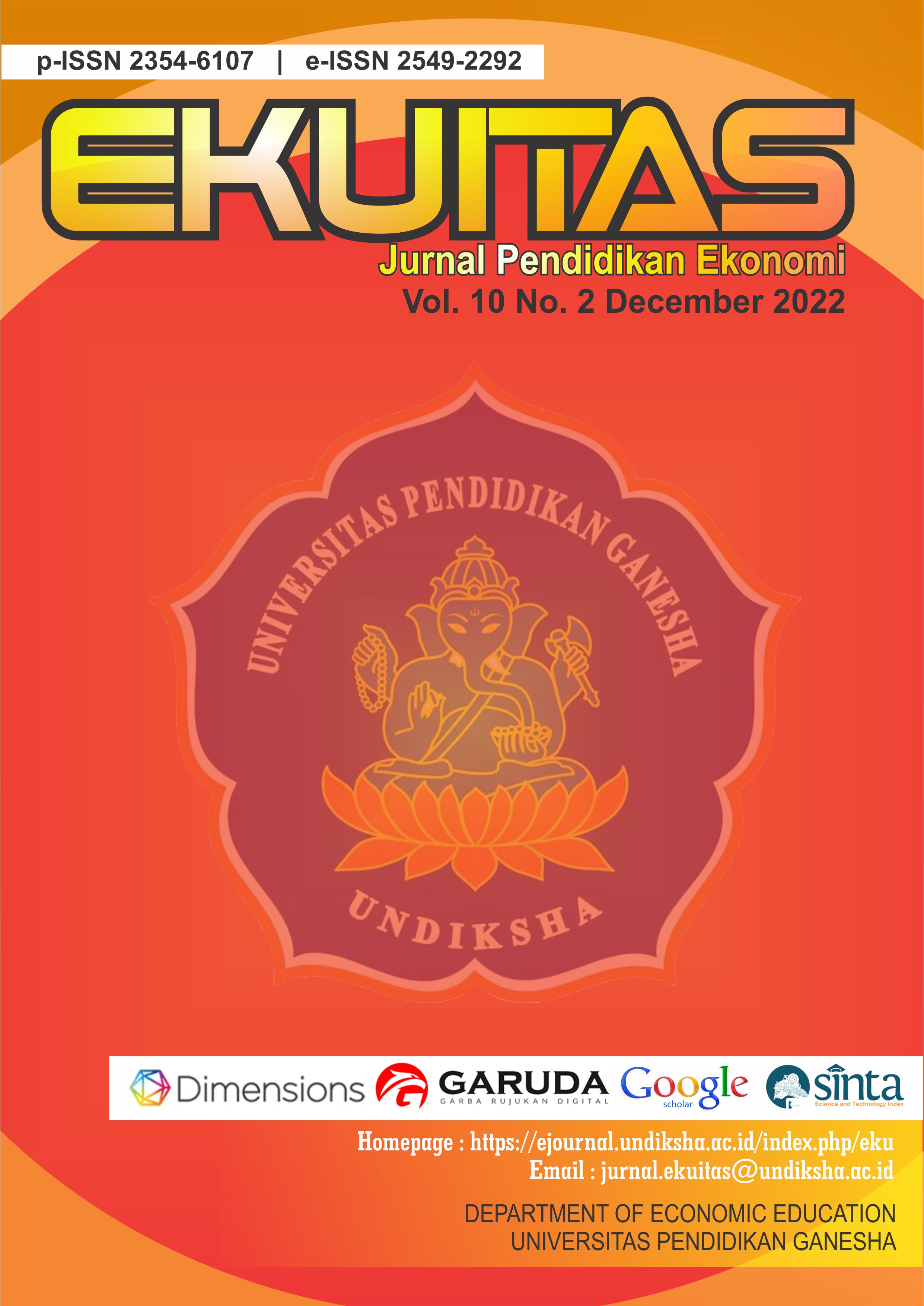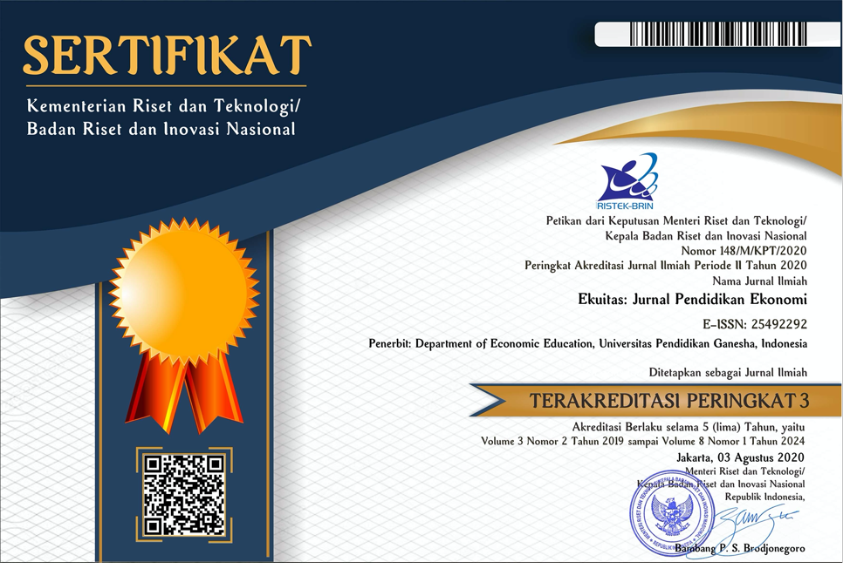Peran Creativity dan Innovative Mindsets Memediasi Entrepreneurship Education Terhadap Entrepreneurial Intention
DOI:
https://doi.org/10.23887/ekuitas.v10i2.54078Keywords:
Creativity, entrepreneurial interest, entrepreneurship education, entrepreneurial intentionAbstract
The purpose of this study was to examine the effect of entrepreneurship education on entrepreneurial intention: creativity and innovative mindsets mediate the effect of entrepreneurship education on entrepreneurial intention. This study used quantitative methods. Data collection techniques using offline questionnaires. Prior to this study, there were 96 students at the Monarch Vocational Training Institute in Bali, Indonesia. Path analysis is used to test hypotheses. The results of this study show that the effect of entrepreneurship education is not significant, and the effect of creativity on entrepreneurial intention is not significant. Entrepreneurship education, if done through innovative thinking, will have a positive and significant impact; if done through creativity, it will have a negative impact on entrepreneurial intentions. This means that innovative thinking is very important to increase entrepreneurial intentions. The practical implications of this research will benefit educational training institutions and governments as it clearly maps the factors that drive students' entrepreneurial intentions, enabling educational institutions to develop instructional programs that are responsive to environmental changes and adaptable to technological developments.
References
Adhikari, G. P. (2021). Calculating the Sample Size in Quantitative Studies. Scholars' Journal, 4, 14-29.
Aima, M. H., Wijaya, S. A., Carawangsa, L., & Ying, M. (2020). Effect of global mindset and entrepreneurial motivation to entrepreneurial self-efficacy and implication to entrepreneurial intention. Dinasti International Journal of Digital Business Management, 1(2), 302-314.
Aladejebi, O. (2018). The effect of entrepreneurship education on entrepreneurial intention among tertiary institutions in Nigeria. Journal of Small Business & Entrepreneurship Development, 5(2), 1-14.
Apuke, O. D. (2017). Quantitative research methods: A synopsis approach. Kuwait Chapter of Arabian Journal of Business Management Review, 33(5471), 1-8.
Ayalew, M. M. (2020). Bayesian hierarchical analyses for entrepreneurial intention of students. Journal of Big Data, 7(1), 16. doi:10.1186/s40537-020-00293-x
Barba-Sánchez, V., & Atienza-Sahuquillo, C. (2018). Entrepreneurial intention among engineering students: The role of entrepreneurship education. European Research on Management and Business Economics, 24(1), 53-61. doi:https://doi.org/10.1016/j.iedeen.2017.04.001
Bauman, A., & Lucy, C. (2021). Enhancing entrepreneurial education: Developing competencies for success. The International Journal of Management Education, 19(1). doi:10.1016/j.ijme.2019.03.005
Bloomfield, J., & Fisher, M. J. (2019). Quantitative research design. Journal of the Australasian Rehabilitation Nurses Association, 22(2), 27-30.
Cera, G., Mlouk, A., Cera, E., & Shumeli, A. (2020). The impact of entrepreneurship education on entrepreneurial intention. A quasi-experimental research design. Journal of Competitiveness.
Crittenden, V. L., Crittenden, W. F., & Ajjan, H. (2019). Empowering women micro-entrepreneurs in emerging economies: The role of information communications technology. Journal of Business Research, 98, 191-203. doi:10.1016/j.jbusres.2019.01.045
del Campo, C. (2017). The role of creativity in entrepreneurship: an empirical study on business undergraduates. The role of creativity in entrepreneurship university courses.
Farashah, A. D. (2013). The process of impact of entrepreneurship education and training on entrepreneurship perception and intention: Study of educational system of Iran.
Feder, E.-S., & Niţu-Antonie, R.-D. (2017). Connecting gender identity, entrepreneurial training, role models and intentions. International Journal of Gender Entrepreneurship & Regional Development.
Galvão, A., Marques, C. S., & Marques, C. P. (2018). Antecedents of entrepreneurial intentions among students in vocational training programmes. Education + Training, 60(7/8), 719-734. doi:10.1108/ET-03-2017-0034
Gardner, B., Lally, P., & Rebar, A. (2020). Does habit weaken the relationship between intention and behaviour? Revisiting the habit‐intention interaction hypothesis. Social Personality Psychology Compass, 14(8), e12553.
Gelaidan, H. M., & Abdullateef, A. O. (2017). Entrepreneurial intentions of business students in Malaysia: The role of self-confidence, educational and relation support. Journal of small business Enterprise Development.
Ikebuaku, K., & Dinbabo, M. (2018). Beyond entrepreneurship education: business incubation and entrepreneurial capabilities. Journal of Entrepreneurship in Emerging Economies, 10(1), 154-174. doi:10.1108/jeee-03-2017-0022
Iwu, C. G., Opute, P. A., Nchu, R., Eresia-Eke, C., Tengeh, R. K., Jaiyeoba, O., & Aliyu, O. A. (2019). Entrepreneurship education, curriculum and lecturer-competency as antecedents of student entrepreneurial intention. The International Journal of Management Education. doi:10.1016/j.ijme.2019.03.007
Joensuu-Salo, S., Viljamaa, A., & Varamäki, E. (2020). Do intentions ever die? The temporal stability of entrepreneurial intention and link to behavior. Education + Training. doi:10.1108/et-03-2019-0053
Kritikos, A. (2015). Entrepreneurship and Economic Growth. International Encyclopedia of the Social & Behavioral Sciences. doi:10.1016/B978-0-08-097086-8.94004-2
Lamanepa, A. W., & Sidharta, H. (2019). The Effect Of Entrepreneurship Education And Seflf-Efficacy To Entrepreneurial Intention. Review of Management Entrepreneurship & Regional Development, 3(1), 35-46.
Linton, G., & Klinton, M. (2019). University entrepreneurship education: a design thinking approach to learning. Journal of Innovation and Entrepreneurship, 8(1), 3. doi:10.1186/s13731-018-0098-z
Lv, Y., Chen, Y., Sha, Y., Wang, J., An, L., Chen, T., . . . Huang, L. (2021). How entrepreneurship education at universities influences entrepreneurial intention: mediating effect based on entrepreneurial competence. Front Psychol, 12, 655868.
Ma, L., Lan, Z., & Tan, R. (2020). Influencing factors of innovation and entrepreneurship education based on the theory of planned behavior. International Journal of Emerging Technologies in Learning (iJET), 15(13), 190-206.
Margaça, C., Hernández-Sánchez, B., Sánchez-García, J. C., & Cardella, G. M. (2021). The Roles of Psychological Capital and Gender in University Students’ Entrepreneurial Intentions. Frontiers in Psycology, 11. doi:10.3389/fpsyg.2020.615910
Nguyễn, T., Phan, H., & Pham, V. (2021). Impact of creativity on student entrepreneurial intention. International Journal of Innovation, 9, 646-663. doi:10.5585/iji.v9i3.19659
Ni, H., & Ye, Y. (2018). Entrepreneurship education matters: exploring secondary vocational school students’ entrepreneurial intention in China. The Asia-Pacific Education Researcher, 27(5), 409-418.
Olubiyo, P., & Olubiyo, J. (2022). Entrepreneurship Education as Tool for Economic Growth: The Roles of Information Centres in Nigeria. University of Nebraska - Lincoln.
Othman, N. H., Othman, N., & Juhdi, N. H. (2020). Entrepreneurship Education And Business Opportunity Exploitation: Positive Emotion As Mediator. Jurnal Cakrawala Pendidikan, 39(2), 370-381.
Ozdemir, D., Dabic, M., & Daim, T. (2019). Entrepreneurship education from a Croatian medical student's perspective. Technology in Society, 58. doi:10.1016/j.techsoc.2019.01.006
Passaro, R., Quinto, I., & Thomas, A. (2018). The impact of higher education on entrepreneurial intention and human capital. Journal of Intellectual Capital, 19(1), 135-156. doi:10.1108/jic-04-2017-0056
Puni, A., Anlesinya, A., & Korsorku, P. D. A. (2018). Entrepreneurial education, self-efficacy and intentions in Sub-Saharan Africa. African Journal of Economic Management Studies.
Rahman, M., Tabash, M., Salamzadeh, A., Abduli, S., & Rahaman, M. S. (2022). Sampling Techniques (Probability) for Quantitative Social Science Researchers: A Conceptual Guidelines with Examples. SEEU Review, 17, 42-51. doi:10.2478/seeur-2022-0023
Sánchez-Medina, A. J., Arteaga-Ortiz, J., Naumchik, R. M., & Pellejero, M. (2020). The intention to quit entrepreneurship in tourism SMEs: The effect of work addiction. International Journal of Hospitality Management, 89. doi:10.1016/j.ijhm.2019.102400
Sun, H., Lo, C. T., Liang, B., & Wong, Y. L. B. (2017). The impact of entrepreneurial education on entrepreneurial intention of engineering students in Hong Kong. Management Decision.
Downloads
Published
How to Cite
Issue
Section
License

This work is licensed under a Creative Commons Attribution-ShareAlike 4.0 International License.








